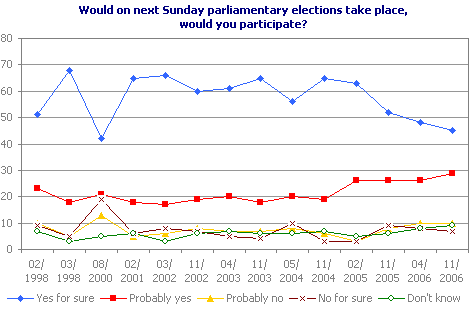ADEPT | Gagauzia 2016 | Presidential 2016 | Elections 2015 | Bashkan 2015 | Gagauzia 2012 | Political Parties
Local elections 2007
The June 3-scheduled general local elections will have an important role besides the proper role of electing mayors and local councillors. At least other five additional factors enhance the importance of the electoral race:
Political forces and local observers usually and with good reason grant a special importance to the race for the City Hall and the Municipal Council of the capital, Chisinau. Secondly, Chisinau is a symbol because it is the only “political fortress” of significant importance which the Party of Communists of the Republic of Moldova (PCRM) has never conquered, though it has tried to do so with four different candidates starting 1999. The electoral importance of Chisinau is also invoked because one forth of Moldova’s citizens reside the capital and more than 60 percent of the country’s economic potential is concentrated here. The role of Chisinau is growing this time because an eventual victory of PCRM would compensate somehow the loss of the 2005 and 2006 elections in Gagauzia. This should motivate the PCRM to nominate the strongest character, who is one of the biggest intrigues of the future campaign, to compete for the post of Chisinau mayor. An eventual victory of the PCRM would attenuate somehow the decline of the PCRM’s rating, which is manifested more strikingly both through findings of surveys and failures in Gagauzia;
The results of elections at district level reveal actually the true electoral force of political parties and answer very exactly the question — would local elections take place concomitantly with parliamentary elections, what party would Moldova’s citizens elect? Party lists are voted at district level and the skills of candidates are less important than at elections held in villages and towns because districts comprise tens of localities and candidates from lists of all parties are not well-known, but the symbol and image of parties, of their national leaders count more instead. From this viewpoint, elections at district level have a much more political than administrative nature, incomparably more than elections in villages and towns. Thus, the results of elections in districts will become the main reference point for the 2009 parliamentary electoral strategies;
The results of elections in districts will be interpreted for sure as an answer to the question — was the “April 4, 3005” vote the necessary, only solution to the impasse, the way the “constructive” opposition claims or it was a “betrayal” of the PPCD, PD and PSL, the way the elements of the former “active” opposition (AMN, PNL, PDS) and a number of extra-parliamentary parties of various orientations insist. From this perspective, besides the Moldovan political tradition — all against all — we may intuit the appearance of some more or less coordinated fronts, with one of these eventual electoral fronts separating the “active” opposition on one side from the “active” and pro-European extra-parliamentary opposition on the other side;
The election of mayors and local councillors in the Gagauz region will be a point of major interest. As said before, the local elections are an intermediary stage between the December 2006 election of governor and the September-scheduled elections for the People’s Assembly of the region. The victory of adherents of Bashkan Mihail Formuzal would ensure a calmer governing, allowing with good reason the governor to become the national political personality with great chances to consolidate the elements of the leftwing political spectre, which aims to restore and maintain good relations between Moldova and the Russian Federation;
The modality of conducting general local elections like the recent elections in Gagauzia will test the democratisation of Moldova in the light of the European Union — Moldova Action Plan. The elections will concentrate all lines of conduct of the state and electoral administrations and police, security and defence bodies in one point. They will outline the real freedom of mass media, parties, and nongovernmental organisations. The declared interest of the OSCE and the Congress of Local and Regional Authorities of the Council of Europe for a long and short-term monitoring of elections will give the European Commission the most cogent evidence to assess the real progresses in implementing the Action Plan by Moldova. If elections are considered bad, Moldova’s relations with the E.U. will be compromised for sure.



